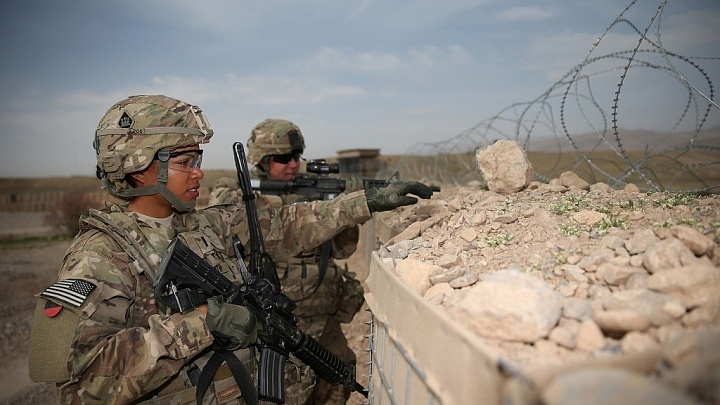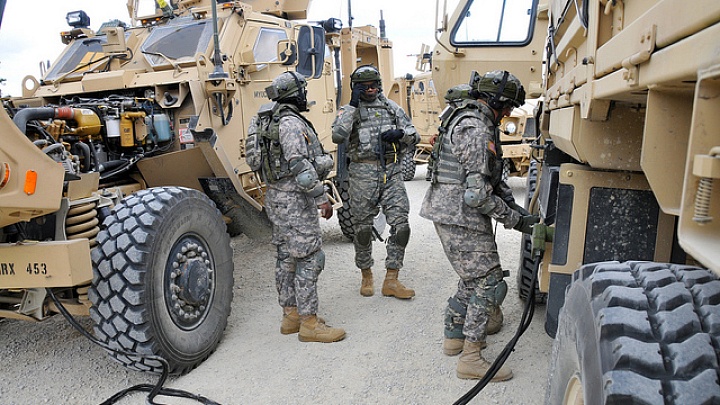Paul Staniland on How to Fix Counterinsurgency
In his new book, Networks of Rebellion: Explaining Insurgent Cohesion and Collapse, Paul Staniland discusses the importance of material resources in explaining how insurgent groups form and fight. In this interview, the University of Chicago professor addresses why COIN failed in Iraq and Afghanistan, as well as recent criticisms of IR scholarship for not being policy-relevant enough.
President Obama in his recent UN speech on ISIS discussed destroying this shadowy network of death. He read your book! But seriously, we hear a lot about networks and its rarely defined. Your book traces a linkage between the prewar structure of social/politicized networks and the subsequent pattern of insurgent behavior. Explain what you mean by networks, and how does it inform our counterinsurgency efforts?
My book studies how preexisting structures of collective action – political parties, religious associations, students’ and veterans’ networks, and tribes, for instance – shape the initial organization of an insurgent group, and how changes in those networks over time can improve or degrade that organizational structure. Insurgency is built upon many of the same relationships that sustain daily political life in times of peace; these networks are repurposed for war, with important implications for how easily insurgent leaders can build powerful institutions at the local and central levels. These social building blocks fundamentally shape the organizational options available to insurgents.
You describe Al-Qaeda in Iraq, nowadays referred to as ISIS, as a vanguard insurgent group. What do you mean by that? How is it different from, say, a parochial group?
A vanguard group has a tight leadership core but lacks strong local roots; these are often urban leaderships that aren’t embedded in rural communities or elites trying to mobilize mass constituencies they have few prior ties to. AQI had this structure, making it vulnerable to local rebellions and unrest. This is what made the 2007 Anbar Awakening so effective, as local allies defected and turned against the central leadership. ISIS, however, seems to be devoting major efforts to building institutions of local control, deterring local resistance, and trying to embed itself on the ground in ways that make a second Awakening much more difficult: It may have transitioned, at least in certain areas, into what I call an integrated group. A parochial organization, by contrast, lacks tight leadership and is instead a collection of powerful local factions, such as the Pakistani Taliban.
You also discuss the importance of resources. At one point you write: Being awash in cash and AK-47s has no single impact on how groups are built and behave. But does the presence of, say, oil in Iraq or Syria make it more or less likely for ISIS-like insurgents to be disciplined? As you point out, the literature seems to be divided on this subject.
The effects of resources depend on group structure. A relatively integrated group is going to thrive on resources: It can allocate them effectively toward political and military goals, and prevent greedy cadres from using these flows for personal enrichment. A parochial group, or a vanguard group whose leadership doesn’t have control over resource flows, is going to be further divided by clashes over who gets what. The literature is divided because resources’ effects are conditional on the cohesion of insurgents. Taking these organizations seriously makes it possible to explain patterns that don’t line up with existing conventional wisdoms.
Your research focuses principally on South Asia, specifically Kashmir, a subject we dont hear much of anymore. How did you first get interested in that region?
I got tired of being in graduate school and began looking for intellectually stimulating, policy relevant places where I could escape to for awhile. I took Hindi, read a bunch of books, and then spent an academic year in India and Sri Lanka, and have returned every couple of years since. It’s an incredibly important region, but American political science struggles with it: Even good datasets miss or misinterpret cases, and few political scientists have devoted themselves to deep area knowledge, and so we end up missing a lot of important things. I’ve found it incredibly fruitful for building new concepts and theories, while also making me much more aware of the struggles, tragedies, and accomplishments of political actors on the ground. The same is true of Southeast Asia, including Burma/Myanmar, where I’ve begun doing research for a book project on “armed politics.”
The administration didn’t see ISIS coming, has been consistently inept in signaling what it actually wants (or can live with) in Syria, and hasn’t explained what airstrikes into Syria are actually going to accomplish.
Youve written critically in the past about COIN, especially about how statebuilding inherently involves some amount of coercion, which is often antithetical to winning hearts and minds. History over the past few years seems to have proven you right. Was COIN doomed from the start, or did we just botch it in, say, Iraq or Afghanistan?
I think there were two problems. First, people ignored the diversity of COIN: many successful counterinsurgency cases don’t look much the “best practices” that became popular back in the halcyon days of the Iraq surge before flaming out in Afghanistan. Christopher Day and William Reno have a great piece on African COIN, for instance, showing that many African regimes have marginalized or defeated insurgent groups, even when doing all the ostensibly wrong things. “COIN” isn’t a single doctrine; it involves much deeper politics than the thin tactical precepts with which it became synonymous.
Second, the COIN that the U.S. pursued was fundamentally about asserting state power: It’s a nasty business of destroying, altering, and controlling social forces. But many political scientists, policymakers, and think-tankers seemed unwilling to face up to this. Instead, we saw a retreat to delicate technocratic euphemisms like “security provision” (men with guns tell people what to do), “service provision” (manipulating patronage networks to bribe and coerce locals), and “stabilization” (achieving a political outcome on the terms desired by the state and its intellectual spear-bearers). Telling happy stories about building capacity, public goods, and winning over the population was a politically palatable way of selling costly, ambitious, bloody American projects.
The aim of this magazine is to help bridge the divide between the policy and academic worlds when it comes to our understanding of war. What do you think policymakers dont get about civil wars studies and policy-relevant academic books like yours? From my own viewpoint, I think most think-tank reports and policy memos tend to be a tad overly simplistic in their assessments of how insurgents behave and how counterinsurgents react. Im curious your own thoughts.
I think there is a lot of excellent policy work on civil wars, so I don’t want to beat up too much on the policy world. But there are three problems I sometimes see. First, there’s too often a dichotomous good guys/bad guys stylization that doesn’t capture the actual motives of actors. It’s normatively satisfying but analytically unhelpful. Second, it’s often very statist: The solution to everything is building institutions, making states more capable, and engaging in various governance reforms. This is sometimes perfectly reasonable, but we need to pay more attention to formal and informal bargains and deals between states and armed actors. These can be more stable and useful than grand reform projects; not everyone wants police, military, and tax collectors in their face all the time. Third, there’s a lot of ambulance chasing: instant experts emerge, but have little to offer beyond vague sound bites. I benefit the most by far from policy outlets with specialist staff focused on particular countries and regions both when they’re in the headlines and when they’re not.
There seems to be an aversion to any kind of Iraq-style intervention, especially in the Muslim world. Is it your view that the days of doing the kind of nitty-gritty counterinsurgencies are over, and that we may be moving into a new era of a kind of Mearsheimer-style Great Power politics? I mean, boots on the ground are barely even being considered in the latest campaign against ISIS.
I think more traditional great power politics will characterize East Asia. In the Middle East, Africa, and South/Central Asia, however, U.S. foreign policy is going to be dominated by drones, special forces, proxy wars, and various forms of support for allied regimes. We have a long period of shadow warfare ahead of us in these regions, even without heavy-footprint interventions.
How would you grade the presidents strategy on Iraq/Syria? I know University of Chicago professors are supposed to be tough graders.
I don’t envy the Obama administration, and don’t think there were obvious courses they should have taken. Sometimes there just aren’t good options. Americans love to overstate American influence, and local allies love to tell us what we need to do to advance their particular goals. The Middle East isn’t nearly as strategically important as we’re constantly told: Asia is where the new centers of global power will be in the decades to come. But the administration didn’t see ISIS coming, has been consistently inept in signaling what it actually wants (or can live with) in Syria, and hasn’t explained what airstrikes into Syria are actually going to accomplish. So I say B-/C+.
There has been some criticisms from some defense wonks and writers in recent weeks of political science as a discipline, specifically peer-reviewed journals like International Security, for not being policy relevant enough or germane to current events in the world. Are these criticisms valid?
I’m sympathetic to the critique that political science can be inaccessible and irrelevant. There are disciplinary fads and obsessions that distract from studying intellectually serious, policy relevant questions, and they should be criticized. But I’ve gotten sick of the idea that academics have nothing useful to say: there is a ton of relevant work on civil conflict, Chinese foreign policy, military doctrine, international interventions, and authoritarian foreign policy, for instance.
Some people in policy and journalism circles are too lazy to absorb work that isn’t ForeignPolicy.com/Buzzfeed-style slideshows and talking points, or are unwilling to deal with work critical of their policy prescriptions. Life is too short to take these people seriously, and we shouldn’t be judged by whether we can get their attention or not. It’s also worth pointing out that we can’t always tell what will be policy-relevant ahead of time, so we should support a diverse array of research questions and methods. Basic research is hugely important for its own sake, and can become relevant very quickly.
[Photo credit: DVIDSHUD via Flickr Commons]
Paul Staniland is an assistant professor in political science at University of Chicago. His research focuses on insurgency and ethnic conflict, particularly in South Asia. He has done field research in India, Sri Lanka, and Northern Ireland, and has published in Civil Wars, Comparative Political Studies, International Security, Security Studies, and the Washington Quarterly, among others.



I am averse to the idea that we “fix” anything. Certainly it would improve the practice of COIN to delegate more authority to those practitioners who will take the time to “live the problem”; however, it would be unwise to give them a blank check to ensure success. And just as the internal politics of an insurgency are shaped by history, so are the borders of the state that the outside world views as suffering (or benefiting for those who view the regime as oppressive) from an insurgency. So why not a headline such as “Paul Staniland on How to Conduct Military-supported COIN until it Reverts to a Policing Problem”?